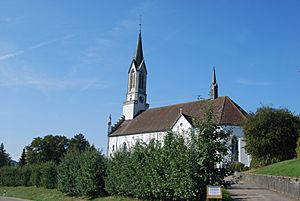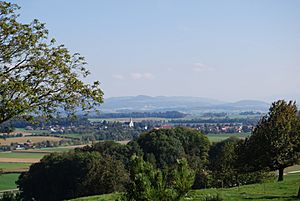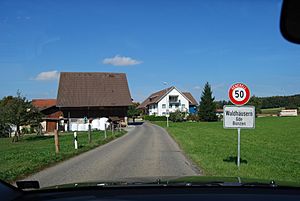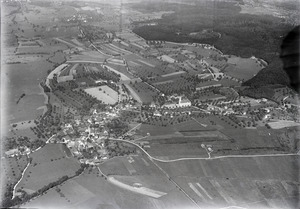Bünzen, Aargau facts for kids
Quick facts for kids
Bünzen
|
||
|---|---|---|
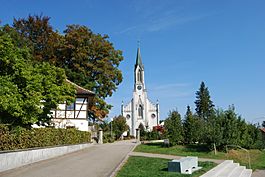 |
||
|
||
| Country | Switzerland | |
| Canton | Aargau | |
| District | Muri | |
| Area | ||
| • Total | 5.78 km2 (2.23 sq mi) | |
| Elevation | 441 m (1,447 ft) | |
| Population
(Dec 2020 )
|
||
| • Total | 1,128 | |
| • Density | 195.16/km2 (505.5/sq mi) | |
| Postal code |
5624
|
|
| Surrounded by | Besenbüren, Boswil, Hermetschwil-Staffeln, Waltenschwil | |
Bünzen is a small town, also called a municipality, located in Switzerland. It is part of the Muri district in the canton of Aargau. Bünzen is a quiet place with a rich history and beautiful natural surroundings.
Contents
History of Bünzen
People have lived in the Bünzen area for a very long time. Scientists have found ancient items near the old moraine (a hill made by glaciers). They also found objects from the Roman era.
The first time Bünzen was officially mentioned was in the year 1259. It was called Bunzina back then. In 1321, a powerful monastery called Muri Abbey bought a large farm and church rights in Bünzen.
After the Swiss Confederation took over the Aargau region in 1415, Bünzen became part of the Hermetschwil district. The local farm manager had some legal powers, like settling small disputes.
The village church was connected to Muri Abbey in 1328. In 1412, Saint George became the church's special patron saint. The church you see today was built in 1862. It has a neo-Gothic style and replaced an older church from 1508.
Geography and Nature
Bünzen covers an area of about 5.77 square kilometers (2.23 square miles). A large part of this land, about 60.8%, is used for farming. Forests cover another 28.4% of the area. The rest of the land, about 10.1%, has buildings and roads.
The town is located in the Muri district. It sits at the bottom of a hill called the Lindenberg. It is also near a moraine that stretches to the Bünz river. Bünzen includes the main village and another village called Waldhäusern. Waldhäusern used to be separate until 1940.
Bünzen's Coat of Arms
The official symbol, or blazon, of Bünzen's coat of arms is quite interesting. It shows a green beech tree on a silver background. At the bottom, there is a wavy blue line. This wavy line represents the Bünz river, which flows through the area.
People of Bünzen
Bünzen has a population of around 1,100 people. Most people in Bünzen speak German, which is about 93.4% of the population. Other languages spoken include Italian and Serbo-Croatian.
The town has a good mix of age groups. About 10.8% of the people are young children (0-9 years old). Teenagers (10-19 years old) make up about 13.9% of the population. Adults and seniors make up the rest.
In Bünzen, many families live in homes with 3 or 4 people. There are also many homes with 5 or more people. About half of the homes in Bünzen are single-family houses.
Religion in Bünzen
Most people in Bünzen are Roman Catholic, making up about 65.8% of the population. Another group, about 17.5%, belong to the Swiss Reformed Church.
Economy and Work
Bünzen has a low unemployment rate, which means most people who want to work can find jobs. The economy of Bünzen involves different types of work:
- Primary sector: This includes farming and other activities that use natural resources. About 71 people work in this area.
- Secondary sector: This involves manufacturing and construction. About 130 people work in these jobs.
- Tertiary sector: This includes services like shops, offices, and healthcare. About 77 people work in this sector.
Many people who live in Bünzen travel to other towns for work. Also, some people come into Bünzen from other places to work. About half of the working population uses a private car to get to work.
Education in Bünzen
Education is very important in Switzerland. In Bünzen, most adults (aged 25-64) have completed high school or even higher education. This could be a university or a specialized college.
For younger students, there are about 89 children attending primary school in Bünzen.
See also
 In Spanish: Bünzen para niños
In Spanish: Bünzen para niños





